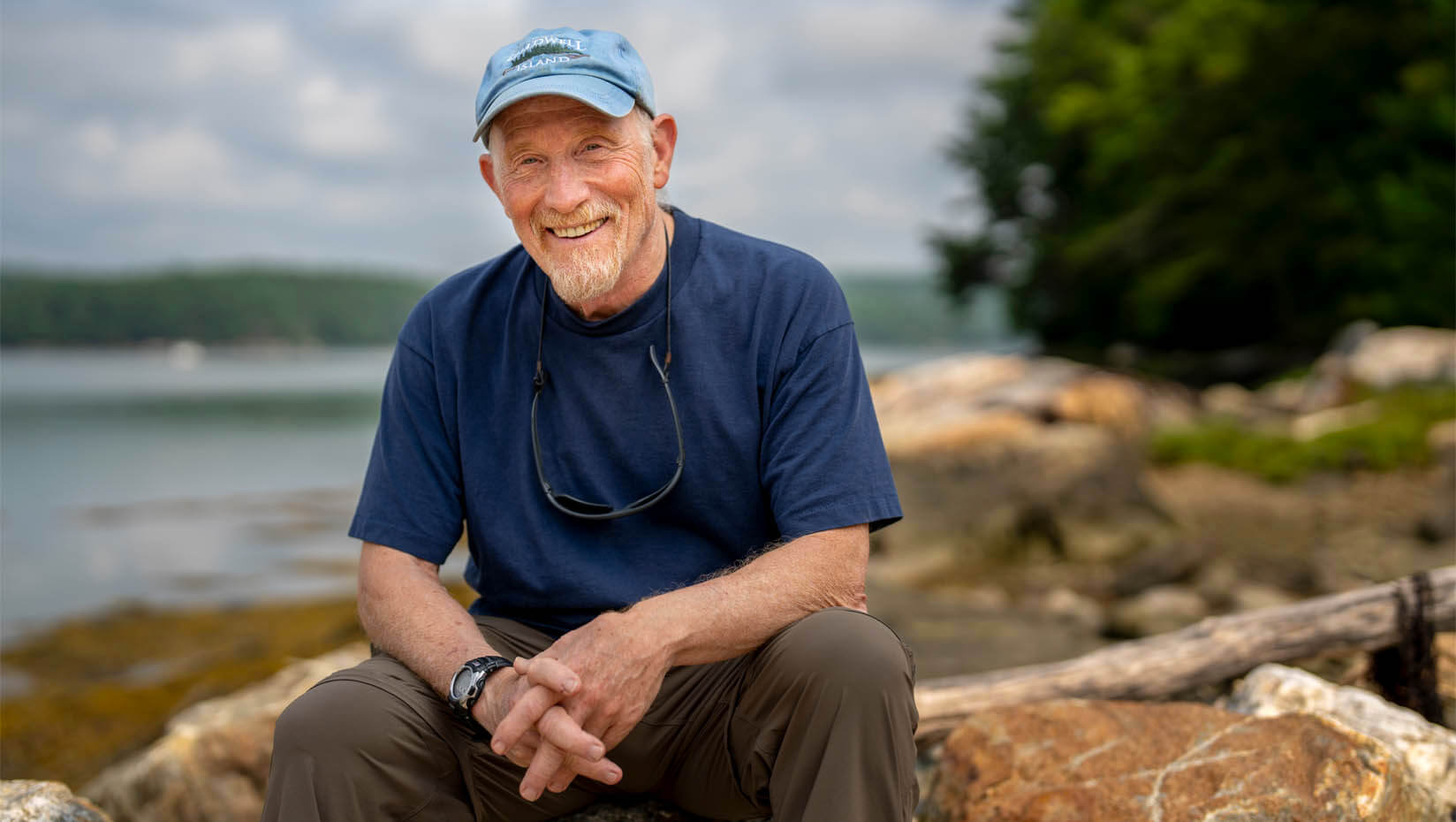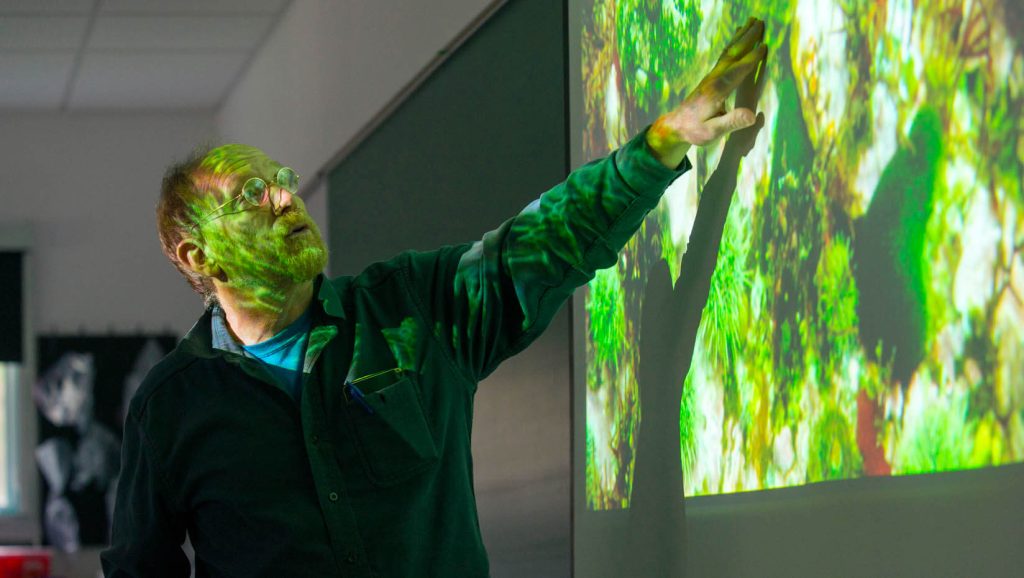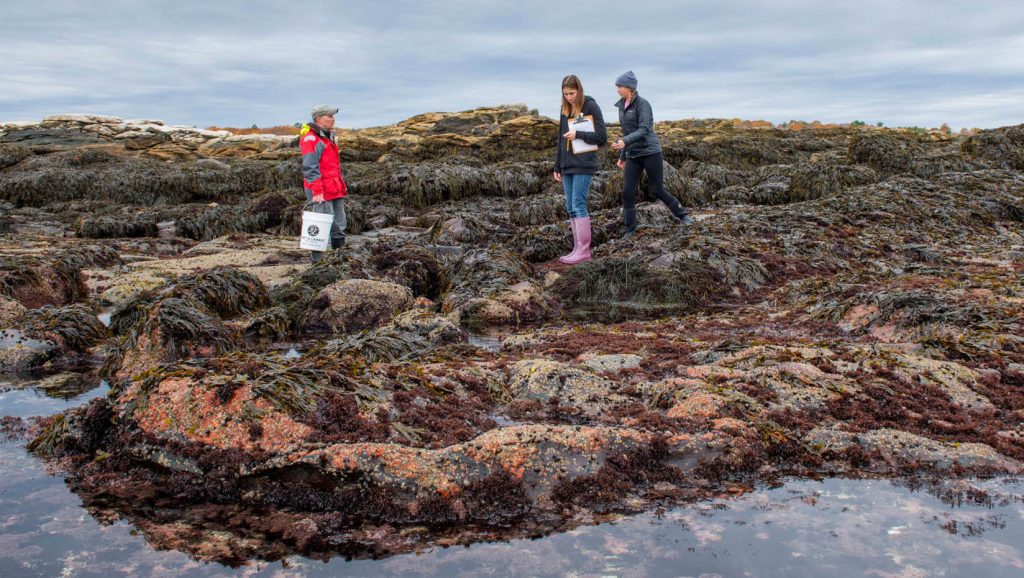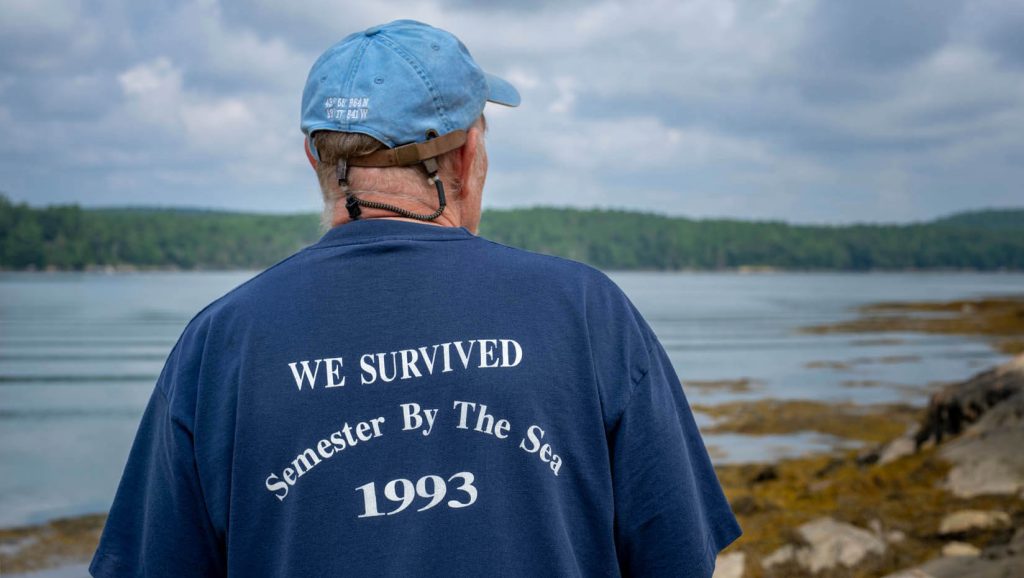
UMaine researcher who helped reshape marine science in Maine retires
When Bob Steneck came to the University of Maine in 1982, there were few marine ecologists in the state, and none interacted with fishermen. He was among the first in Maine to work with lobstermen on research, traveling with them on their boats, diving to the seafloor to study lobsters and sharing his findings with them.
At that time, there was a scientific consensus that the lobster population in the Gulf of Maine was declining. By working with lobstermen and diving down to the depths of the gulf, Steneck showed that the population was actually on the rise.
Steneck’s work and that of his students and colleagues helped propel an expansion of and change in how lobster fisheries research is conducted in Maine. Over the proceeding decades, Steneck’s students continue collaborating with lobstermen and other fishermen on their studies. They focused more on work that benefitted these industries, the management of Maine fisheries and the coastal communities that relied on them.
“We were able to take a different perspective by studying lobsters in their natural habitat. My hope was to do research to help the people of Maine,” Steneck says. “What came out of this work was research that was collaborative and directed toward improved management of the lobster fishery.”
After a 41-year career at UMaine filled with numerous studies, scientific publications, outreach and teaching the next generation of marine scientists, conservation biologists and leaders, Steneck, professor emeritus of oceanography, marine biology and marine policy has retired.
Steneck’s research helped understand and manage Maine’s most lucrative fishery, now worth almost $400 million. He and his students learned how baby lobsters grow up on the seafloor, what lobsters eat, who eats them and how they sustain their populations. This basic research was also useful for lobstermen, as well as fishery managers and policymakers who must determine the status and trends of lobster stocks.
Much of Steneck’s research combined both basic and applied research. Basic research is driven by curiosity of what is currently unknown to science, whereas applied research focuses on solutions to specific problems. At the start of his career, most marine scientists focused exclusively on basic research. Due in part to Steneck’s influence, more of his colleagues and students work to integrate basic and applied research, often with the cooperation of fishermen in several industries.
In collaboration with his former student Rick Wahle, who most recently served as director of UMaine’s Lobster Institute, and other colleagues, Steneck discovered that as ocean temperatures rose over the years, lobster nursery grounds expanded in eastern Maine (northeast of Penobscot Bay), resulting in sharp increases in lobsters there. Warming temperatures elsewhere in the Gulf of Maine, however, may increase threats of disease and interactions with invasive species.

A few years ago, Steneck and his colleagues published another study warning that lobsters’ current abundance and high value may be creating a false sense of security. Specifically, they worried that the economic value of lobsters was masking the risks related to relying almost on a single species to maintain Maine’s maritime heritage. Maine’s marine economy would be in greater danger of collapsing if something happens to the lobster.
The fishery has become a lucrative monoculture of lobster created by centuries of intense fishing that removed apex or top predators from the Gulf of Maine. While it’s immensely profitable, the fishery and Maine’s blue economy has become more susceptible to ecological disruptions. Other fisheries close to home faced similar problems. Steneck says the lobster fishery in southern New England was once thriving, but suffered collapse resulting from a lethal disease.
“Lobsters are a very big economic driver in Maine and of our multi-century maritime history, and I wanted everyone to understand the risk of depending on a single species,” he says. “I think people understand the problem, but I don’t think there are many great solutions.”
Over the past half century, Steneck has also conducted research on coral reefs in the Caribbean. Since the 1980s, he and UMaine undergraduate and graduate students would travel to coral reefs such as those surrounding St. Croix in the U.S. Virgin Islands, Mexico, Belize, Bonaire and the Dominican Republic. Students learned how to conduct research with scientific diving as they learned about coral reef ecology and team-work to monitor the coral reefs. Based on their research, Steneck and his students helped devise management strategies to help preserve the reefs.

Their work played a crucial role in guiding coral reef management for the reefs of Bonaire, located in the Dutch Caribbean near Venezuela. Since 2003, he and his students monitored the coral reef systems surrounding Bonaire. They discovered that the seaweed that harms coral increased threefold years following a bleaching event in 2010, and this resulted in increases in harmful seaweed and declines in coral cover and juvenile corals. But because Bonaire had managed to increase herbivores, particularly parrotfish, seaweed eventually declined and juvenile and adult coral increased to pre-bleaching levels. Coral levels have since remained high as of March 2023 when Steneck and his class conducted their last coral reef monitoring field trip to Bonaire. Their work concluded that local management of reef fish could help preserve the reefs themselves, and it did.
As a result of this and other coral reef research, reef managers and government officials in Bonaire and elsewhere banned parrotfish harvesting, prohibited certain traps and established no fish zones. In Bonaire, these regulations provided a boom to their $50 million tourism industry.
“These are management changes that are a direct result from our coral reef class research and going down there for 20 years,” Steneck says. “It was great that students got the chance to see applications come from their studies of Bonaire’s coral reefs.”
While Steneck has conducted extensive ecological research worldwide, including in Australia’s Great Barrier Reef, Guam and Palau in Micronesia, French Polynesia, Mexico, Belize, Honduras, the Virgin Islands, Bahamas, Antigua and St. Lucia in the eastern Caribbean, Alaska’s Aleutian Islands and Norway throughout his career, the work he is most proud of is training many top-tier scientists and conservation leaders in the field.
In addition to Wahle, some former students of Steneck include Carl Wilson, director of the Maine Department of Marine Resources’ Bureau of Marine Science; Elizabeth Stephenson, director of the Marine Conservation Action Fund; Amanda Leland, executive director of the Environmental Defense Fund; Susie Arnold, senior ocean scientist and director of the Center for Climate and Community for The Island Institute; Ruleo Camacho, marine ecologist for the National Park Authority for Antigua and Barbuda; Jeanne Brown, communications and outreach coordinator for the Northeast Climate Science Center at the University of Massachusetts Amherst; and Kirt Moody, a professor of biology and environmental science at Columbia College.
“I’m really happy about not just getting my students through their academic programs, but also getting them started on their careers,” Steneck says.

Steneck says he is still engaged in marine science, conducting microscopy research at the Darling Marine Center and writing a textbook on coral reefs, but he also wants to enjoy photography and woodworking. As he moves on to the next phase of his life, he leaves behind some advice for his former colleagues to be creative and collaborative when applying for research grants and encourage students to think broadly and stay curious.
“When you teach students how to think, and you urge them to see the bigger picture, that’s really a better path to take than just teaching the traditional scientific methods,” he says.
Contact: Marcus Wolf, 207.581.3721; marcus.wolf@maine.edu
